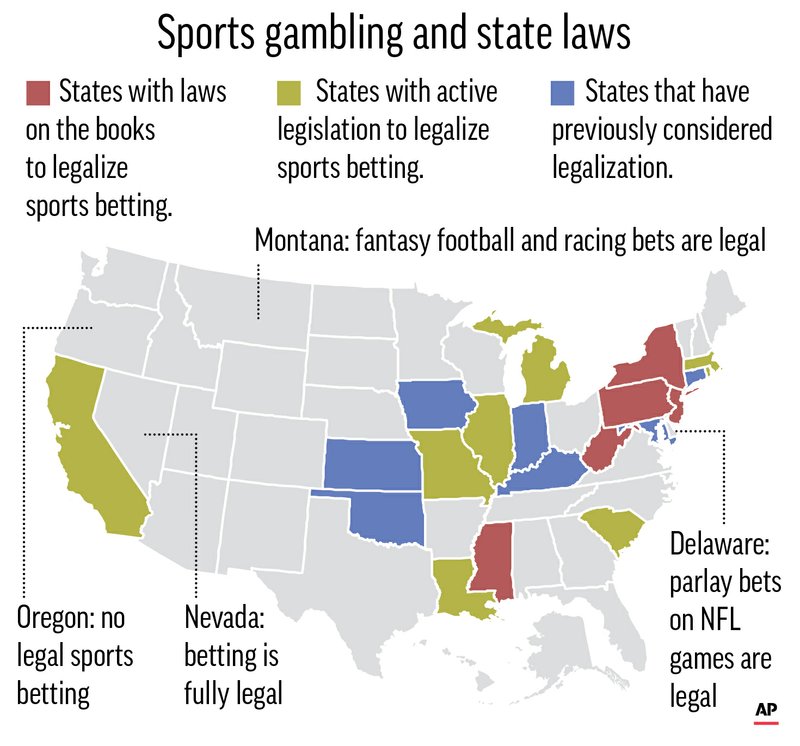
WASHINGTON (AP) — A decision by the Supreme Court means American sports fans will soon have many more places to place legal bets on the results of football, baseball, basketball, hockey and other games.
Five states have the edge in the race to legalize sports betting because they already passed laws contingent on the Supreme Court striking down the 1992 federal ban on such gambling, which the court did on Monday. And that doesn’t include Delaware, which could move quickly to expand the limited legal gambling it has already.
Several other states are likely to follow them in the coming months or years as they seek to capitalize on the economic growth and tax revenue that legal gambling can bring. Including the four states where some form of sports gambling was already legal, 24 states have at least considered getting into business with sports book operators.
Here’s a state-by-state breakdown of where things stand:
DELAWARE
Parlay bets on NFL games are already available in Delaware because it was one of the four states with pre-existing laws authorizing sports betting that were not affected by the federal ban. Delaware tried to legalize bets on individual games in 2009, but that ran afoul of the federal law. With the ban lifted, Delaware has the infrastructure in place through its lottery and casinos to quickly begin expanding its wagering options. State finance secretary Rick Geisenberger told The Associated Press on Monday that full-scale sports gambling could be available at Delaware’s three casinos by the end of June.
MISSISSIPPI
A bill authorizing sports betting at the state’s casinos was approved last year. Mississippi Gaming and Hospitality Association deputy director Michael Bruffey said Monday that the state’s 28 casinos could welcome bettors by the time football season begins. Bruffey said casinos have been in talks with state regulators about draft rules allowing sports betting, and that regulators could vote quickly.
NEW JERSEY
The Garden State spent years fighting the sports betting ban in court, culminating in its victory on Monday. The legislature has twice passed laws legalizing sports betting, and operators of the Monmouth Park horse racing track said Monday they’d start taking bets within two weeks “unless someone stops us.” The track has the capability of taking bets almost immediately, but lawmakers and Democratic Gov. Phil Murphy would prefer to pass a bill to regulate sports betting before any sports books open. Deputy Assembly Speaker John Burzichelli said it will probably be several weeks before a revised bill is enacted.
NEW YORK
Voters in 2013 approved a constitutional amendment authorizing commercial casinos, and that amendment authorized the casinos to open sports books if the ban were lifted. However, further legislation is needed before any bets can be taken, and the legislature is considering several bills that would shape the sports gambling industry in the state. Major League Baseball, the NBA and casino interests have done intense lobbying in Albany in recent months.
PENNSYLVANIA
Democratic Gov. Tom Wolf signed a bill last year that authorized sports books at the state’s casinos along with mobile and online sports betting. But gambling industry leaders are skeptical that sports books will flourish in Pennsylvania because of the bill’s tax provisions: a 36 percent tax on gambling revenue and a $10 million licensing fee for sports book operators.
WEST VIRGINIA
Lawmakers this year approved sports betting at the state’s five casinos and on approved mobile apps in the event of a Supreme Court decision repealing the ban. Republican Gov. Jim Justice allowed the bill to become law without his signature and later announced that he’d reached a deal for casinos to pay a fee to professional sports leagues to help them protect the integrity of their games. Casino operators, however, said the meeting with Justice ended without a deal and that casinos continue to oppose the fee. The leagues had lobbied unsuccessfully for such language to be part of the law.
OTHER STATES
Nevada is the only state that currently allows wagers on individual games. In addition to Delaware, Montana and Oregon were already allowed to have sports betting in a limited form through their state lotteries because of laws that predated the federal ban. Montana only offers fantasy football and fantasy racing bets, and Oregon’s lottery discontinued its only sports betting product years ago. Both could now revisit those decisions.
Seven states have active legislation to legalize sports betting: California, Illinois, Massachusetts, Michigan, Missouri, Rhode Island and South Carolina. Eight others have considered legalization in recent months or years: Connecticut, Indiana, Iowa, Kansas, Kentucky, Louisiana, Maryland and Oklahoma.
___










